Half a year ago, Ubisoft released Assassin’s Creed Origins. It was in some ways the most ambitious Assassin’s Creed game ever made, and in other ways noticeably less ambitious than its predecessors.
In the months since then, Origins has become considerably more interesting.
Join me now as we climb into the Animus and travel back in time to the world inhabited by our distant ancestors, those people who lived in the fabled era of October, 2017. From there, we’ll embark on a journey through our unusually exciting first six months with Assassin’s Creed Origins.
-
Assassin’s Creed Origins came out on October 27, 2017. It was released simultaneously for PS4, Xbox One, and PC. It shared that release date with Wolfenstein II: The New Colossus and Super Mario Odyssey, making it probably the biggest single video game release date of the year.
It received generally positive reviews. In my review for Kotaku, I said that for all its extraordinary visual splendor, it was ultimately an ordinary video game. But I liked it overall.
- A couple months later I recorded a spoilercast with fellow Kotaku Assassin’s Creed fans Luke Plunkett and Stephen Totilo, where we talked more in-depth about what we made of the story and the game overall.
-
There was one weird wrinkle just as it was coming out, as bots flooded the game’s Metacritic user reviews with fake, positive reviews that were often total gibberish.
It’s still unclear why or how that happened, though Metacritic’s boss said that it does happen from time to time.
-
The game immediately got some quality cosplay and plenty of glitch videos, of course.
It was a Ubisoft game, and despite its level of polish relative to other recent Assassin’s Creed games, it still had some funny bugs. In particular, was patched several months later in January.
- There were a few interesting small details hidden inside the game, including some irrefutable evidence that Assassin’s Creed‘s present-day timeline and Ubisoft’s Watch Dogs series take place in the same universe.
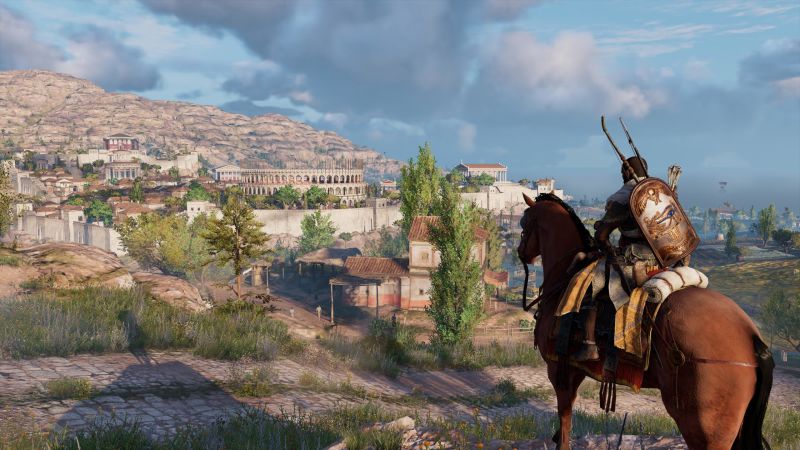
- The game also proved shockingly large, earning some praise as players discovered more of its vast expanse. Its sheer scale somewhat made up for the fact that the game leaned so hard on its straightforward numbers-based RPG levelling system and dropped many of the interesting gameplay experiments (support assassins, grappling hooks, city takeover, pirate ships) of past games.
-
There was also a fascinating story behind the explorable tomb the developers placed within the Great Pyramid of Giza.
Just as the game was coming out, news broke that scientists had discovered a previously undetected space within the pyramid… but that space was already in Origins. Turns out that was because the developers based their design on the work of a French architect who had already theorised the location and general size of the chamber, and correctly, as it turned out.
-
The developers were clear up front that there’d be a lot of stuff coming to Origins after release. A couple weeks before the game came out, Ubisoft launched a trailer detailing the two main DLC packs Curse of the Pharaohs and The Hidden Ones, which you only got if you bought the game’s season pass.
They also detailed a bunch of free post-release stuff including the Trial of the Gods and a Horde Mode, and the ambitious Discovery Tour, a combat-free mode that would offer guided historical tours of the game’s re-creation of ancient Egypt.
-
The Trial of the Gods consisted of a series of limited-time boss fights that would pop up on players’ maps. Go to the spot on the map, and an Animus glitch would crack open and a massive boss would emerge, fashioned after one of the Egyptian pantheon.
They started hitting the game in November, but as Stephen pointed out at the time, that was actually a little early for most players to be high enough level to try them. Fortunately they have repeated many times since then, and just about everyone has had a chance to defeat all the gods. Ubisoft eventually even offered harder iterations of the gods.
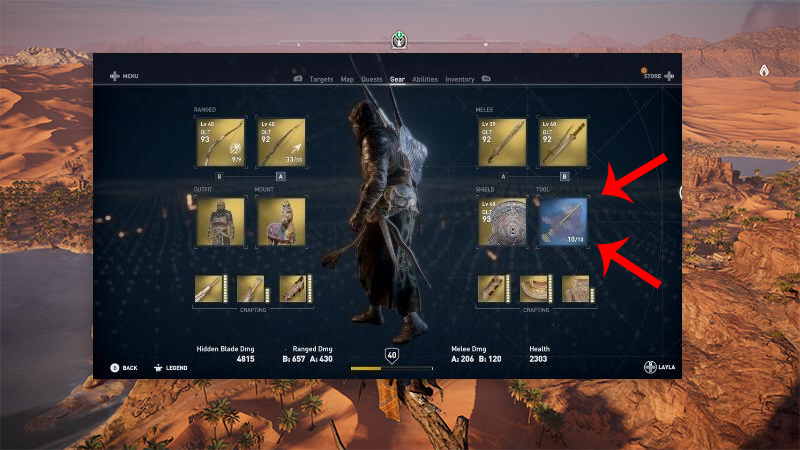
Screenshot: Cince09 (Reddit)
-
In December, Origins got an extremely important patch that changed the backdrop colour of your throwable item from blue to gold.
That made it possible to make your entire gear screen show gold items instead of having a single one remain blue. And I mean, let’s be real, that was basically been a game-breaking problem, so it’s a good thing Ubisoft fixed it. This was also one of many patched changes that showed Ubisoft being swiftly responsive to numerous complaints about the game offered in its subreddit or official message boards.
-
In a December “Developer Q&A” blog post seemingly written with an awareness that some fans found the amount of the game dedicated to the franchise’s modern-day storyline lacking, Ubisoft wrote that “The main story in each game is the one set in the past.”
That frustrated some fans who’ve wanted more from the game’s present-day storylines, and reinforced the series’ clear trend toward minimising the present-day stuff compared with the first few games. Sorry, present-day-lore junkies.
-
The 1.1.0 patch also brought a couple of other notable new features, including a new Nightmare difficulty mode, enemy level scaling to keep low-level areas engaging for high-level players, and a more intuitive way to customise Bayek’s look in the “gear” menu.
That last option made it much easier to make sure Bayek was always rocking a beard, a shaved head, and no hood, which is objectively his best look and I will hear no arguments to the contrary.
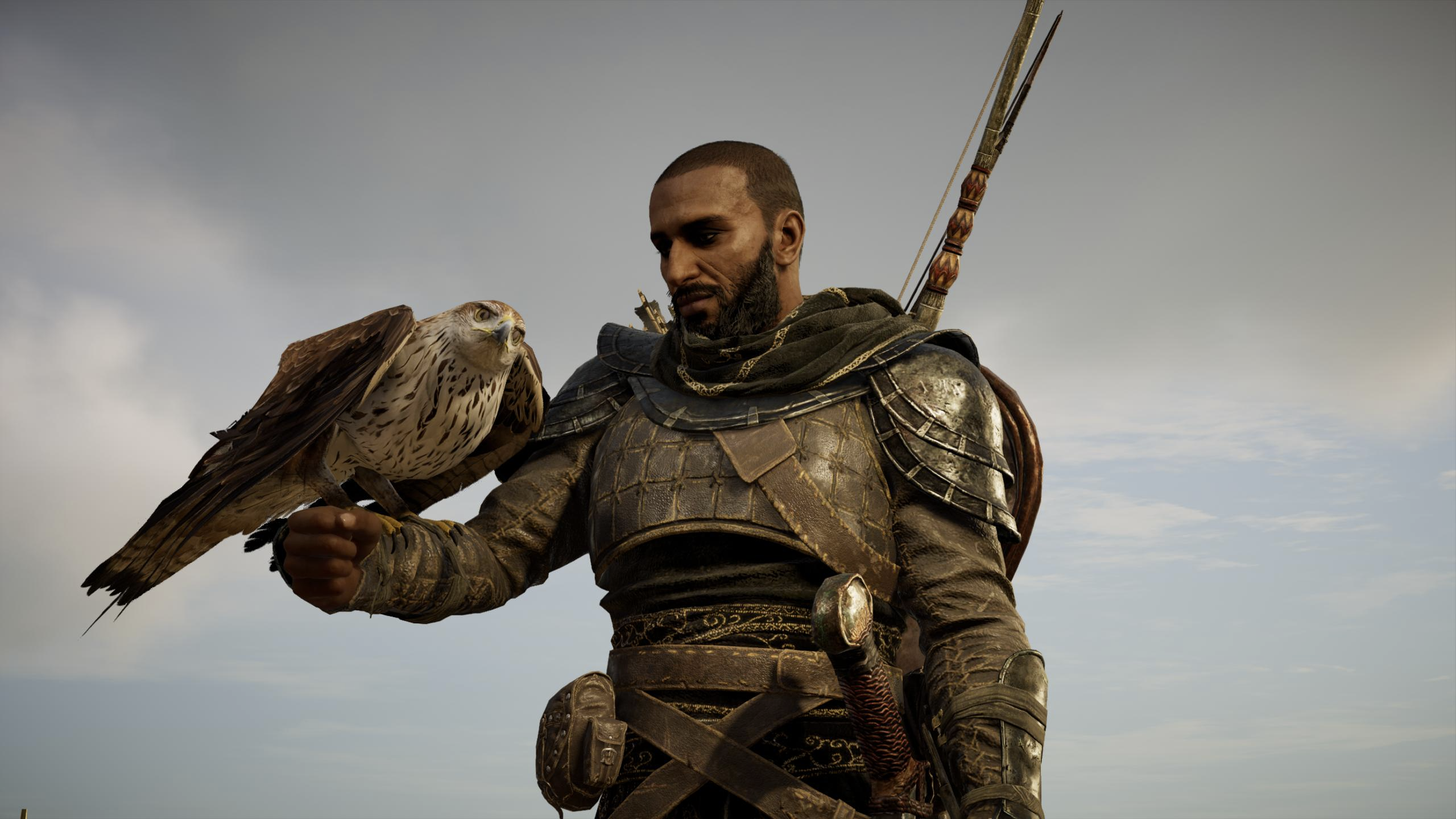
It’s just true.
-
One funny addition to the game in December was a bit of crossover content tied to Square Enix’s Final Fantasy XV. If you went to a spot in the desert and solved a puzzle, you could get a chocobo-lookin’ camel to ride and unlock some weapons that look like something Noctis would use.
The Origins content corresponded to a much more elaborate event that took place in Final Fantasy XV, which included an entire mini story-campaign tied to an Assassin’s Creed festival that Noct and his bros attended.
-
The game’s first expansion, The Hidden Ones came out in January, and while it offered some nice-looking new environments, it was really just more Assassin’s Creed Origins.
Not such a bad thing, though given how absurdly huge the base game was (I STILL haven’t finished every sidequest!), the expansion didn’t really stand out that much from what players already had.
Entertainingly, the expansion was accidentally released a week early on Xbox One, though it was subsequently pulled by Ubisoft.
- In advance of The Hidden Ones, Ubisoft added a free bonus mission that set up the events of the expansion. It was a cool way to stitch together old and new parts of the game, and was a trick they’d done earlier to set up a free horde mode, and then in March for Curse of the Pharaohs.
- Also in January, Ubisoft patched in an audio message to a tomb that you come across in the main game. That set players theorising that it was meant to hint at some as-yet-unveiled secret, but Ubisoft claimed it was just rectifying a mistake. The message had been meant to be in the game at launch, but for some odd reason had been left out.
-
Discovery Mode hit in February, and it basically turned the game into a museum. It was a neat idea, and it was particularly cool that Ubisoft sold it as a separate standalone game on PC.
Many raved about it, though there was some drama over Ubisoft’s decision to censor naked statues (there are no nude statues in the Discovery Mode version of the game).
John Walker at Rock, Paper, Shotgun, offered a more critical look, pointing out that the tour’s lack of clear sourcing and transparency undermined what could otherwise have been a nice educational tool.
- In February Origins also got a New Game+ mode, one of several post-release additions aimed at letting players draw out their time with the game and get even more out of it.
- The second DLC, Curse of the Pharaohs, hit in March, and Luke Plunkett liked it a lot. It goes buckwild with the story, introducing phantoms from the afterlife, mystical curses, and all sorts of other dimension-shifting shenanigans. Even from the little I’ve played it’s clear that this expansion is special, and will doubtless rank among the best Assassin’s Creed expansions Ubisoft has put out.
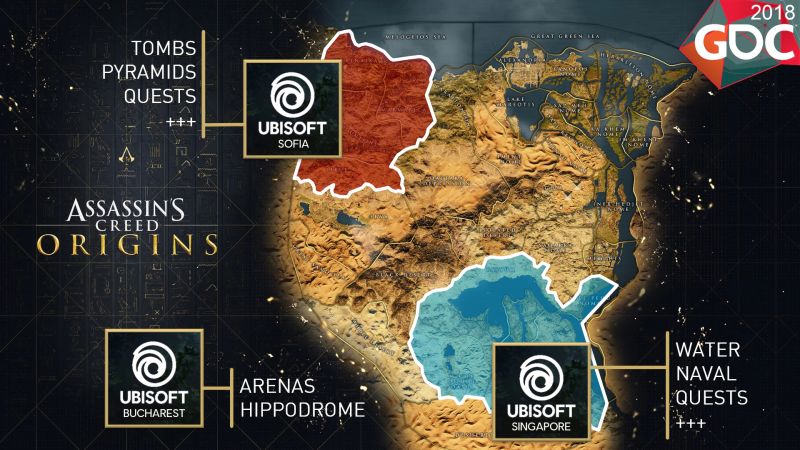
- At the Game Developers Conference in March, Ubisoft developers shared how they managed to make a game as vast and full of stuff as Origins. The answer, as it turned out, was to have not one but several full studios working on the game, a practice they have been refining over the years to allow them to make such vast games on a somewhat consistent timetable.
-
In April, Ubisoft put out the “Animus Control Panel” for PC players, which lets you tweak all sorts of parameters for the game like enemy awareness, maximum number of tamed animals, and even enemy hitboxes and attack speeds.
It’s a nifty bonus, and it’d be nice if console players will eventually get it. That was the last thing added to the game, and no further additions, features, or expansions have been announced.
As you can tell just by reading through this post, Origins has gotten an unusually large amount of post-release support, even for a game from a major-label publisher like Ubisoft. Like Ghost Recon: Wildlands before it, Origins demonstrates how Ubisoft is testing and recalibrating their approach to converting their most well-known series into service games.
In the case of Origins, it also demonstrates how an entirely single-player game can still function like a service game, keeping players engaged and coming back months after they ordinarily would have stopped.
I’ve grown fonder of Origins over the six months since I first played it. That’s been at least in part because Ubisoft has done such a good job of refining, expanding, and deepening the game.
Origins will never be as varied, experimental, or interesting as some other Assassin’s Creed games, but it’s beautiful and relaxing, and makes for a pretty splendid way to spend an evening unwinding after a long day.
It is a testament to Origins‘ ambitious scope that after dozens and dozens of hours, I’ve still so many more things to do. It’s a testament to its quality that even after all that time, I’m still glad I’m not finished.
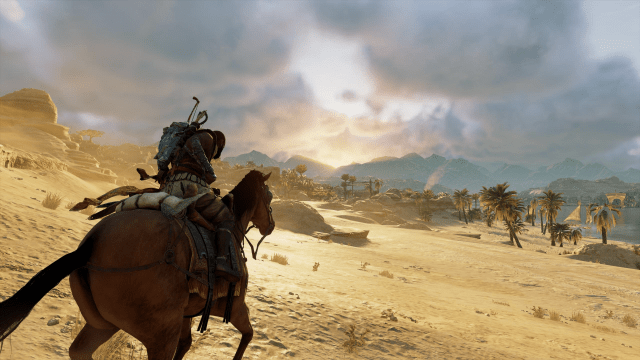
Comments
5 responses to “Assassin’s Creed Origins, Six Months Later”
How about a Payday 2, 6 years later lol
Plus the Tardis.
I thoroughly enjoyed my time with the game, I still haven’t finished off the very last of the second DLC, I should get back to that at some point and give a discovery tour or two a whirl.
I want to want to play AC, it was by far and away one of my favourite series’ after the 2nd game but it’s fallen so far since then. It was the whole modern day hidden secrets/conspiracies that made it so compelling for me, the gameplay just a nice aside? Guess it still sells so maybe I’m the minority but without any of that (how good was the modern day parts in 1 & 2? I couldn’t wait to get back out of the animus!) it’s just Ubisoft the game: history edition? There’s nothing compelling except to chase the dots on the map. Haven’t played this i guess, but after giving up on Unity & Syndicate (not to mention FC & watchdogs) i think i’m burnt out on ubi.
Couldn’t agree more. Almost everything that made the game unique has been diluted down by the ‘Ubi-Game’ formula.
The modern day sci-fi plots that kept me coming back game after game have been reduced down to maybe 15 minutes of actual gameplay (out of 140 hours i’ve spent on the game in total).
The entire point of chasing down every little thing used to be revealing the grand conspiracy and advancing the plot.. now you just get treasure and some outfits…. K…
Only bought the game a couple of months ago but ive loved every minute of it. I was nervous about buying it after being burnt by the previous two games. But this more than delivers. Well worth playing.